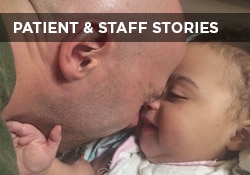This website uses cookies so that we can provide you with the best user experience possible. Cookie information is stored in your browser and performs functions such as recognising you when you return to our website and helping our team to understand which sections of the website you find most interesting and useful.

Susan E. Mazer, Ph.D. Blog
Thoughts and ideas on healthcare
Hi, and welcome to my blog! I'm Susan E. Mazer -- a knowledge expert and thought leader on how the environment of care impacts the patient experience. Topics I write about include safety, satisfaction, hospital noise, nursing, care at the bedside, and much more.
Florence Nightingale: On Nursing, Hospitals, and Hope
May 17, 2010
In 1996, my husband Dallas Smith and I were asked to do a presentation on Florence Nightingale. So, together with lots of her writings and books, we developed “Florence Nightingale: In Her Own Words” — combining Nightingale’s words and our music to bring the telling of her story together with the emotional component that only music can deliver.
Until that time, I knew little about Florence Nightingale other than her title, “Mother of Modern Nursing.” In fact, I knew little about why nursing became modern and what it was prior to Nightingale.
Since then, of course, I have learned over and over that the history of nursing is one that tells the tales of healthcare probably more than any other profession.
Doing this presentation now for so many years, I have come to feel that Nightingale is whispering in my ear. In costume and with what seems to be a channeled British voice, I have told her story in the first person as a means of bringing to life her intolerance for even one life ended because of, “what we neither knew nor practiced.”
And, the knowing and the practicing may not come together even today.
As I look at the hospital of today – the most common assumptions we all make and what we accept as hospital practices, it is clear that nursing has undoubtedly progressed while the hospital environment has been victim to competing interests.
For example, Nightingale claimed that daylight and fresh air were critical to patient recovery. It took a study in 1984 by Roger Ulrich to attach the science to Nightingale’s theory to change hospital construction standards to require patient rooms to have windows.
While fresh air is yet to be re-added to the hospital room, what is clear is that our ventilation systems are far from effective in ensuring that the air is as clean as needed.
Nightingale opened her School of Nursing at St. Thomas Hospital as the first secular school of nursing. Until then, all nurses were religious women or, as is today, sisters, daughters, wives, or mothers.
The profession has expanded dramatically. Today, one can be a certified nursing assistant, a registered nurse, a clinical nurse specialist, a nurse practitioner, or a doctor of nursing. These many levels of expertise play out at the bedside in dramatic ways, with nurse practitioners being able to not only examine patients but prescribe medications and perform many functions that were once limited only to physicians.
The relationship between nurses and doctors has been dramatized, with physicians portrayed as being heavy-handed and nurses as struggling to save their patients. This is not wholly true nor wholly false.
Nurses are the professional patient advocates – the individuals who take on ownership of the patient’s journey from illness into recovery. The physician does not advocate in the same way; rather the physician diagnoses and authorizes treatment for the patient.
Even when a patient is in the hospital, the doctor does patient rounds, but nursing is done over the full 24 hours, being available in moments as the patient needs require.
Without exception, the physicians and nurses serving the needs of our communities are the heroes. Those who cannot or could not take the stress created by a system that continually monetizes the value of life and health – placing more value on illness than recovery.
The nurses are the ones doctors count on to take care of their patients. To patients, nurses are the voice of hope as well as the sure hand in relieving their pain and suffering.
One more thought: Intolerance for carelessness that carries with it a human price tag is not difficult to defend. If you read Notes on Nursing, specifically the footnotes, you will find Nightingale’s pithy voice of such intolerance.
Again, neither difficult to defend or adopt. To give you an idea of her attitude and directness, her treatise, Notes on Hospitals, begins with:
It may seem a strange principle to enunciate as the very first requirement in a Hospital that it should do the sick no harm. It is quite necessary, nevertheless, to lay down such a principle, because the actual mortality in hospitals, especially in those of large crowded cities, is very much higher than any calculation founded on the mortality of the same class of diseases among patients treated out of hospital would lead us to expect.
I hope that the progress of nursing and medicine are forward – that science monitors and checks itself, and that nursing practice just keeps getting better and better.










